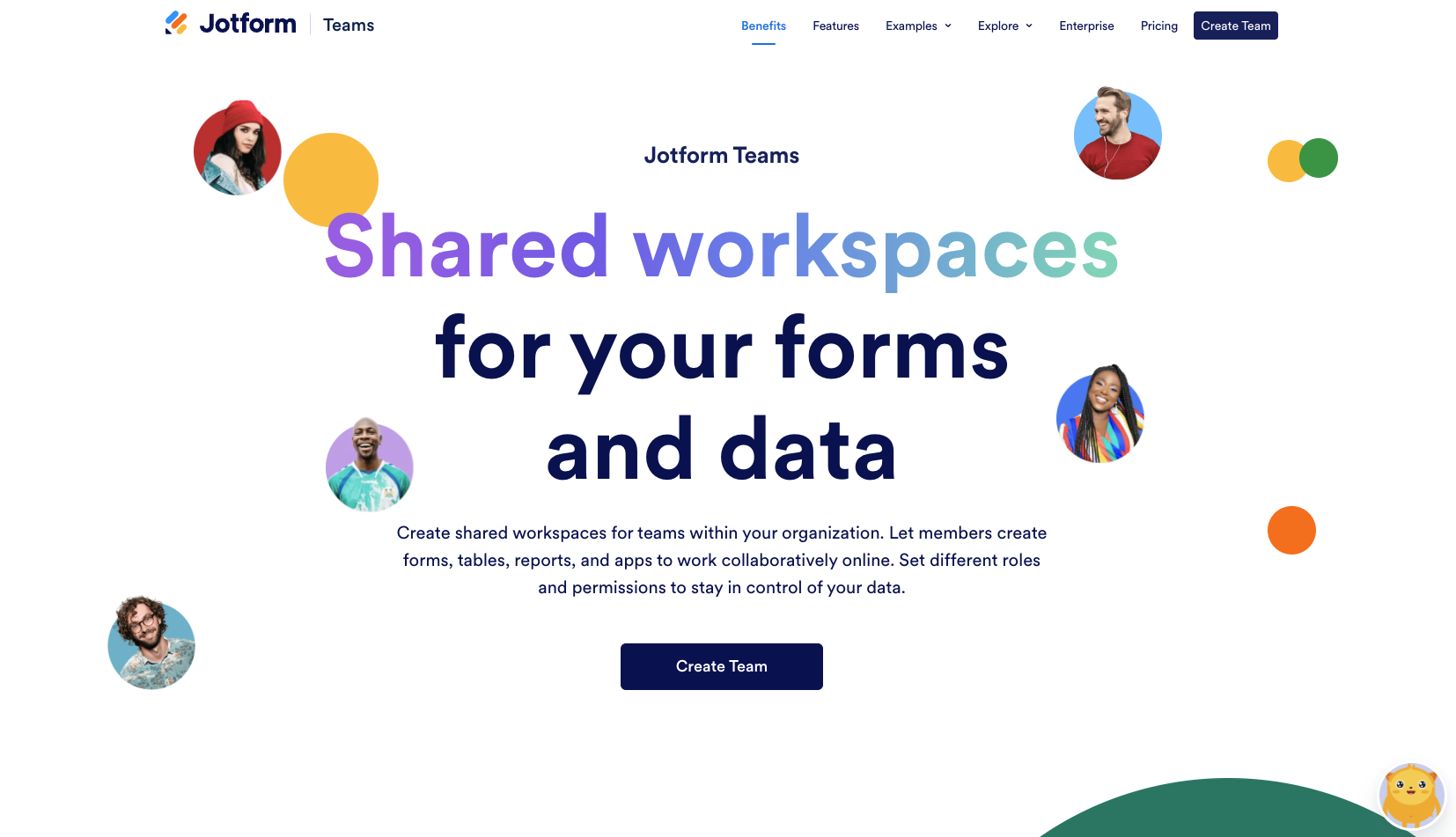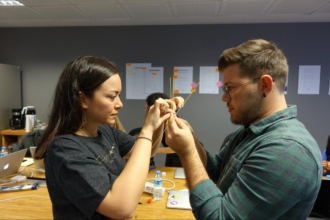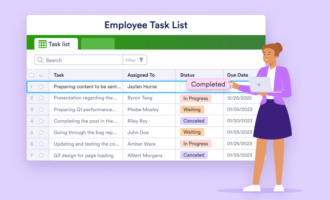13 ways to improve team efficiency
- Set and track SMART goals
- Measure key performance indicators
- Clarify roles and responsibilities
- Provide the right tools
- Automate repetitive workflows
- Keep documents organized in one place
- Build a collaborative culture
- Optimize the physical workspace
- Use each member’s strengths
- Gather and act on employee feedback
- Identify areas to improve and train
- Reward successes appropriately
- Allow room to fail
No matter the industry or type of organization, teamwork is essential for success. Highly efficient teams enable a business to achieve its goals, whether they include surpassing the competition, increasing profits, lowering costs, or anything else. In fact, a recent study shows that employees who work in collaborative settings are over 50 percent more efficient at completing tasks than employees who work independently.
However, while the concept of teamwork is a good thing, most teams don’t naturally function as well-oiled machines; they need an extra boost to produce their best work. In this article, we look at why efficient teamwork is important and provide valuable tips on how to make a team more effective.
Why supporting good teamwork matters to your organization
Teams are a foundational part of any workplace — departmental teams, project teams, and more are basic vehicles organizations use to get things done. A productive team is able to accomplish more than an unproductive one, helping the company to reach its targets sooner and more efficiently.
But teams are also more than that. An employee’s team actually affects their engagement and enjoyment at work. When a team works well together, employees enjoy each other’s company, are more engaged in their activities, and feel a sense of accomplishment from their work. Engaged, happy employees are likely to stay at their jobs longer than those who are not engaged; they also tend to be motivated to contribute their best.
When team members are aligned with one another, have clear roles and objectives, and are supported by a positive culture of collaboration, they are able to use their position as a learning opportunity. Working as part of an efficient team, employees can gain new skills from their colleagues, learn from one others’ mistakes, and optimize workplace processes — all of which benefits both the employee and your business.
“Team efficiency and productivity are crucial for a lot of reasons,” says Lindsay Karny, a human resources professional and certified resume writer at Resume 2023. “It improves the workplace culture and helps team members feel more fulfilled and confident in their work.”
How to make a team more efficient
When it comes to making a team more efficient, it’s important to remember that it doesn’t happen by accident. While some teams work well together without any intervention, usually teams require support from leadership in order to reach their full potential. Below are some concrete things you can do to support and encourage optimal team performance.
Set and track SMART goals
SMART goals are Specific, Measurable, Achievable, Realistic, and Timely. They ensure the team has a clear objective they are working toward that is attainable given the resources and time the team has available. Be careful of setting goals for teams that are unrealistic, which deflates morale.
Measure multiple key performance indicators
You won’t know whether a team is efficient without measuring its performance. To do that, you need to identify specific key performance indicators and track them at a regular frequency. “An organization must put in metrics around what they are trying to accomplish,” says Matthew W. Burr, owner of Burr Consulting, LLC, a strategic human resources consulting firm. “It all starts at the leadership or board level and trickles down, and is a way to hold everyone accountable.”
Ensure employees understand their roles and responsibilities
In efficient teams, each member knows their responsibilities, their priorities, and — most importantly — how those things fit into the goals of the larger organization. This information helps motivate team members and enables them to be accountable for their work.
“It is imperative that all members have an understanding of the scope of their role within the context of the team and what needs to be accomplished for everyone to reach higher levels of efficiency and productivity,” says Karny. “This can be done by reinforcing communication among teammates, providing feedback on performance, and setting up accountability systems that track progress and provide motivation to improve team effectiveness.”
Invest in the right tools
Organizations can boost team efficiency by providing them with resources that are designed to help them work more effectively. For example, Jotform Teams is a tool that supports collaboration through shared workspaces.
Automate repetitive workflows
Administrative tasks, such as following up on requests via email, can slow down a team considerably. Many such workflows can be easily automated using the right tools so that employees can focus on high-impact work to reach goals instead.
Organize documents in one location
This issue can be a major headache for many teams. Frequent searching for documents, and lost or inaccessible documents impede productivity. Tools such as Jotform Teams house all important assets in one location. Leaders can also assign permissions to each document in Jotform Teams, ensuring that confidential information doesn’t fall into the wrong hands.
Create a culture of collaboration
When employees know that organizational leaders inherently value, support, and promote teamwork, they’ll do their best to become productive team contributors. Create a culture of collaboration from the top down, having executives model the benefits of working together and helping each other.
Don’t forget the physical surroundings
In addition to the right tools and the right culture, organizations must review the working conditions to make sure they are conducive to efficient work. Are there too many distractions in the office, for example, or is there a lack of space where multiple people can meet, work, and talk regularly ? While these may seem like small issues, creating an environment that is ideal for productivity can help promote efficient teamwork.
Harness each team member’s strengths
Any given team will have a spectrum of people with different strengths and weaknesses. It’s the job of leadership to identify each employee’s strengths and use them in a way to help the team excel as a whole. For example, if one team member is highly organized, they should be in charge of document management. “Help your team members improve their skills by offering training opportunities, mentorship programs, or other growth opportunities,” says Karny. “It demonstrates that you appreciate each team member’s dedication and care about their personal and professional growth. Investing in your staff will increase the quality and efficiency of their work output and boost morale within the team.”
Place emphasis on employee feedback
Employees need a way to share workplace feedback with their leadership team. Similarly, leadership needs to have a process in place to review and implement employee feedback. Doing so can help organizations create processes that boost efficiency. Jotform Teams is a great way for employees to collaboratively offer feedback regarding organizational tools, processes, and culture.
Know which areas require improvement
Identifying the areas that require improvement — such as communication or coding for example — is one thing, but organizations also need to put processes in place to help teams improve in those areas. External workshops, internal training, and other learning development opportunities are all good options. “Organizations need to have the right subject matter expertise in the roles they have assigned,” says Burr. “It’s important to provide the knowledge and training so that everyone is set up for success. Organizations should also be thinking about whether they have put a career plan or succession plan in place so they are thinking about the next level.”
Reward team successes the right way
Giving teams an external motivator, such as a monetary reward, is a great way to encourage productivity. While some companies reward productivity with more work, organizations that have highly efficient teams know the types of rewards employees really want, such as merit increases, bonuses, paid time off, and even simple recognition. “Employers should provide incentives to ensure employees have an adequate work-life balance, with flexible hours or working-from-home options if possible,” says Karny.
Give them room to fail
This may be a controversial suggestion, but it’s important to remember that people learn by making mistakes. If a team doesn’t reach a target due a mistake they made, it’s likely they will never make that same mistake again. While failure can be hard to stomach, it teaches employees lessons they may not learn otherwise.
Support greater team efficiency with Jotform Teams
Jotform Teams is an ideal solution for organizations that value the importance of teamwork.
Jotform Teams makes collaboration simple. Teams can keep all of their Jotform assets — whether it’s forms, surveys, tables, or PDFs — in one easy-to-access location and assign various levels of permission for access. For teams large and small, Jotform Teams supports team efficiency, effectiveness, and productivity.
This article is for team leaders, HR professionals, and business managers who want to improve collaboration and boost productivity within their organizations. It’s especially useful for those looking to implement practical strategies, tools, and cultural changes to make their teams more efficient and engaged.






























Send Comment: